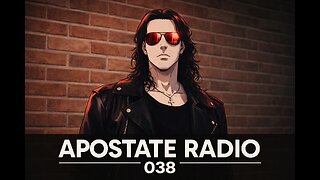Premium Only Content

Episode 3069: From Sorrow to Joy - Morning Episode
Nightly Zoom Coordinates for Rosary:
Meeting ID: 865 8978 0399
Passcode: Wjjv4960!
Speak Lord for your Servant is Listening
Book Recommendation of the Day
Claudianus Mamertus is best known for his theological treatise De Statu Animae ("On the State of the Soul"), composed between 468 and 472 AD. In this work, he argues for the incorporeality of the soul, countering the views of Faustus of Riez. His arguments draw upon the philosophies of Plato, Porphyry, Plotinus, and Augustine, and the treatise is considered a precursor to Scholasticism.
Welcome to CR, your place for truth, tradition, and timeless Catholic wisdom. Today is Sunday, May 11, 2025, and the Church, in her traditional liturgy, celebrates the Fifth Sunday after Easter. As we continue the Paschal season, the readings focus on preparing the faithful for Christ’s Ascension and the sending of the Holy Ghost.
Before I get into this episode let me provide.
Pope Leo XIV’s Address to the College of Cardinals (May 10, 2025)
A Traditional Catholic Perspective
In his first formal audience with the College of Cardinals since his election, Pope Leo XIV he started with saying the Our Father and Hail Mary in Latin with all the Cardinals and then he emphasized the importance of continuing the reforms initiated by his predecessor, Pope Francis, particularly the need for the Church to respond to modern challenges while remaining grounded in its timeless truths. While acknowledging the historical significance of Pope Francis' pontificate, Pope Leo XIV called upon the Cardinals to assess how these modern approaches align with the perennial teachings of the Church, particularly in regard to the faith, the sacred traditions, and the magisterial authority of the Church.
The Call for Continuing Reforms: A Balance of Tradition and Modernity
While Pope Leo XIV recognizes the necessity for the Church to address modern challenges, including the ethical dilemmas arising from technological advancements like artificial intelligence, it is critical that these discussions are framed within the context of traditional Catholic doctrine. The Church has long upheld the importance of human dignity, the sanctity of life, and the moral order, and these values must guide all inquiries into emerging issues. The ethical implications of AI, for instance, should not be approached with a relativistic lens, but rather should be governed by objective moral truths, such as those found in the natural law, which the Church has always upheld.
Pope Leo XIV's reference to Pope Leo XIII’s advocacy for workers’ rights during the Industrial Revolution is a poignant reminder of how the Church has addressed socio-economic issues through the lens of moral principles. Pope Leo XIII, in his encyclical Rerum Novarum, recognized the dignity of labor and the responsibility of both employers and employees to treat one another with respect and justice. In the face of new challenges, Pope Leo XIV calls for similar discernment, ensuring that human dignity is not compromised by technological progress. Artificial intelligence, while offering advancements in various fields, must never be allowed to usurp human agency, nor should it overshadow the moral responsibility of individuals.
Commitment to the Mission of Evangelization and Tradition
Pope Leo XIV also reaffirmed his commitment to the inclusive mission of the Church, as outlined by Pope Francis in his 2013 apostolic exhortation, Evangelii Gaudium ("The Joy of the Gospel"). However, from a traditional Catholic perspective, it is vital that this mission be rooted in the unchanging truth of the Gospel rather than adapted to secular ideologies or social trends. The Church’s mission is not one of mere inclusivity in a modern sense, but of calling all to repentance and salvation through faith in Christ. The Church’s mission is not to embrace the world in its errors but to offer the light of the Gospel to those trapped in darkness. The emphasis on conversion, the sanctification of souls, and the call to live according to God’s commandments should be at the heart of the Church's evangelizing efforts, particularly in the modern world where relativism and secularism are rampant.
The Importance of the Second Vatican Council Reforms: Clarification and Fidelity
Pope Leo XIV also discussed the reforms initiated by the Second Vatican Council (1962-1965), calling for the continued implementation of its teachings, but always through the lens of fidelity to Tradition. While the Council was an event that sought to address the changing dynamics of the world and the Church, it is imperative that traditional Catholics hold fast to the belief that the deposit of faith is unchanged and universal, regardless of temporal shifts. Sacred Tradition, Sacred Scripture, and the Magisterium of the Church continue to serve as the firm foundation upon which all papal reforms must rest.
The Church cannot simply adopt secular ideologies under the guise of aggiornamento (the modernization of the Church), as some post-Vatican II implementations have suggested. Traditional Catholic thought asserts that true reform is always in continuity with the Apostolic Tradition, as it was handed down from the Apostles and preserved through the centuries. As Pope Leo XIV continues to guide the Church, he must emphasize the need for doctrinal fidelity and liturgical reverence, ensuring that reforms do not lead to the dilution of the Catholic faith or compromise the integrity of the Church’s teaching and worship.
Conclusion: A Call to Return to Tradition in the Face of Modernity
Pope Leo XIV’s call to continue the reforms of his predecessor, Pope Francis, must be understood as an effort to balance faithfulness to tradition with an engagement with contemporary issues. However, it is essential that these reforms never lead the Church into modernist tendencies or distort the truths handed down through the centuries. The dignity of the human person, the sanctity of life, and the moral teachings of the Church must remain at the center of the papacy's actions.
As we face the challenges of the modern world, particularly the ethical implications of technological advancements like artificial intelligence, the Church must never lose sight of its eternal mission: to guide souls to salvation through the truth of Christ, remaining rooted in the unchangeable teachings of Sacred Tradition.
So let us pray for Pope Leo XIV, that he may lead with wisdom, humility, and fidelity to the Apostolic faith, guiding the Church in the path of truth and holiness as it navigates the complexities of the modern age.
Epistle – 1 Peter 2:11–19
"Dearly beloved, I beseech you as strangers and pilgrims, to refrain yourselves from carnal desires which war against the soul, having your conversation good among the Gentiles: that whereas they speak against you as evildoers, they may, by the good works which they shall behold in you, glorify God in the day of visitation.
Be ye subject therefore to every human creature for God's sake: whether it be to the king as excelling; or to governors as sent by him for the punishment of evildoers, and for the praise of the good.
For so is the will of God, that by doing well you may put to silence the ignorance of foolish men: as free, and not as making liberty a cloak for malice, but as the servants of God.
Honour all men: Love the brotherhood: Fear God: Honour the king.
Servants, be subject to your masters with all fear: not only to the good and gentle, but also to the froward.
For this is thankworthy: if for conscience towards God, a man endure sorrows, suffering wrongfully."
Reflection:
St. Peter reminds us that we are pilgrims, not citizens of this world. We must not seek comfort in worldly passions but strive for virtue and humility in the face of injustice. The Church teaches that suffering endured patiently and for God’s sake has immense merit, especially when it is unjust. Here, the Apostle calls all Christians to imitate Christ, who bore suffering without retaliation. In a world that misuses the concept of freedom, true liberty is found in serving God, not in casting off restraint.
Gospel – John 16:16–22
"At that time, Jesus said to His disciples: A little while, and now you shall not see Me: and again a little while, and you shall see Me: because I go to the Father.
Then some of His disciples said one to another: What is this that He saith to us: A little while, and you shall not see Me; and again a little while, and you shall see Me, and, because I go to the Father?
They said therefore: What is this that He saith, A little while? We know not what He speaketh.
And Jesus knew that they had a mind to ask Him, and He said to them: Of this do you inquire among yourselves, because I said: A little while, and you shall not see Me; and again a little while, and you shall see Me?
Amen, amen I say to you, that you shall lament and weep, but the world shall rejoice: and you shall be made sorrowful, but your sorrow shall be turned into joy."
Reflection:
This Gospel is a preparation for the Ascension. The Lord foretells His absence: “You shall not see Me.” He is referring to His death and departure to the Father. Yet He quickly adds, “you shall see Me,” pointing to His Resurrection and the coming of the Holy Ghost at Pentecost. This passage teaches us a profound spiritual truth: the Christian life involves sorrow, but this sorrow is not the final word. Christ transforms sorrow into joy not by removing the Cross, but by revealing its redemptive power. The world rejoices in its passing pleasures, but the disciple of Christ awaits a joy the world cannot understand: the joy of union with God.
Saints of the Day – May 11
St. Mamertus, Bishop of Vienne († c. 475)
o He instituted the Rogation Days, days of fasting and prayer before Ascension Thursday to avert natural disasters. His example reminds us of the need for penance, processions, and supplication in times of societal unrest.
2. Commemoration of the Apostles Sts. Philip and James (transferred from May 1)
o Apostles of Christ, both martyred for the faith. St. Philip died in Phrygia, and St. James the Less was thrown from the temple in Jerusalem. Their feast strengthens our hope in apostolic tradition and martyrdom for truth.
Themes and Traditional Quotes
• Theme 1: Suffering for conscience' sake has supernatural value.
• Theme 2: The world rejoices in the absence of Christ, but His faithful wait with patience and hope.
• Theme 3: True freedom is not license, but loving submission to God’s will.
Quotes:
“You shall weep and lament... but your sorrow shall be turned into joy.” – John 16:20
“The patient man is better than the valiant.” – Proverbs 16:32
“We are pilgrims in this life, strangers in a land not our own.” – St. Augustine
“By the Cross, joy has entered the world.” – Byzantine Liturgy
“No one is truly free except the one who serves God.” – St. Louis IX
Conclusionary Prayer:
In the name of the Father, and of the Son, and of the Holy Ghost. Amen.
O Lord Jesus Christ, who comforted Thy disciples with the promise that their sorrow would one day become joy, grant us the grace to carry our crosses with patience and love.
Turn our weeping into rejoicing, not in this passing world, but in Thy presence for eternity.
Send us the Holy Ghost, the Comforter, to strengthen us in every trial.
O Mary, Mother of Sorrows, be our refuge in exile and joy in eternal life.
Sacred Heart of Jesus, we place our trust in Thee.
In the name of the Father, and of the Son, and of the Holy Ghost. Amen.
Thank you for joining us today. May the sorrows of this life bring you closer to the joy of Christ’s Resurrection. Stay strong, stay faithful, and may Our Lady keep you under her mantle. Until next tim
-
 1:11:28
1:11:28
Sarah Westall
14 hours agoNewsmax Fired Me on Air! What Gets You Fired These Days w/ Dennis Michael Lynch
49.3K23 -
 54:31
54:31
OFFICIAL Jovan Hutton Pulitzer Rumble
12 hours agoReview Of The Con In Progress!
66.9K17 -
 2:32:35
2:32:35
IsaiahLCarter
1 day ago $9.34 earnedRageaholics Anonymous || APOSTATE RADIO 038 (w/RAZ0RFIST)
47.9K7 -
 1:13:11
1:13:11
vivafrei
18 hours agoEARLY HOLIDAY STREAM! Kirk / TPUSA Internet Pile-On CONTINUES! Minnesota Fraud! Georgia Faud & MORE!
126K155 -
 12:34
12:34
Robbi On The Record
20 hours ago $12.53 earnedThe Strange Origins of Santa Claus | The Real History of Santa & Christmas
107K61 -
 40:57
40:57
TacticalAdvisor
16 hours agoUnboxing Tactical Box/Best Sniper Upgrade | Vault Room Live Stream 049
104K6 -
 33:15
33:15
TampaAerialMedia
22 hours ago $7.33 earnedFort Myers Beaches 2025 - North Captiva, Sanibel, Estero, & Bonita Springs - Recovery from Ian
62.3K5 -
 46:22
46:22
Degenerate Plays
22 hours ago $4.38 earnedI Completely Crashed Out During This Mission - GTA Online : Part 12
56K1 -
 1:10
1:10
WildCreatures
8 days ago $3.29 earnedDistracted driver smashes into slowing car in front of him, caught on dashcam
38.1K8 -
 43:18
43:18
Athlete & Artist Show
1 day ago $2.41 earnedMaking Back The Money We LOST On JAKE PAUL
35K1